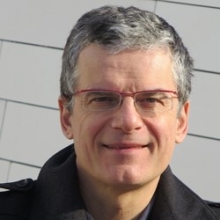MSE Seminar: Extrusion 3D Printing - from Inks to Metal Microlattices

Department of Materials Science & Engineering
Northwestern University, Evanston, IL
Abstract: To create metallic scaffolds or microlattices with sub-millimeter strut architectures, we develop a new method, extrusion 3D printing, consisting of two simple steps. First, metal oxide particle suspensions (inks) are extruded, in air and at ambient temperature, into linear struts creating self-supporting lattices. Second, the oxides are hydrogen reduced to metal and sintered into dense metallic microlattices.
We describe here microlattices made of pure metals – copper, iron, nickel or tungsten - created from inks consisting of the respective metal oxides. In all cases, thermochemical reduction and sintering of the 3D-printed oxide scaffolds result in large shrinkages (up to 80% by volume) but without cracking or distortion, as investigated via in-situ X-ray tomography.
We also demonstrate metallic alloys, using blends of oxides: Fe-20Ni-5Mo (a steel) and Co-Cr-Fe-Ni (a high-entropy alloy) and study, via in-situ X-ray diffraction, the interdiffusion resulting in homogenous alloys.
Bio: David Dunand received bachelor's/master's degree at the Swiss Federal Institute of Technology in materials engineering in 1986 and a doctorate in materials science and engineering from MIT in 1991. After serving on the MIT faculty until 1997, he joined Northwestern University (NU). His research focuses on processing, structure and mechanical properties of metallic alloys, composites and foams. Examples range from freeze-casts iron foams for batteries to selective-laser-melted aluminum scaffolds for light-weight structures, to creep- and oxidation-resistant Al-, Ni-, Co- and Fe-based alloys for engines and gas turbines.
Dunand is a fellow of ASM International (the Materials Information Society) and a fellow of TMS (the Minerals, Metals and Materials Society). His awards include the 2012 Materials Science & Engineering A Journal Prize, the Distinguished Scientist/Engineering Award Structural Materials Division of TMS and two departmental Teacher of the Year Awards at NU. Dunand is a co-founder of NanoAl, LLC, a startup company developing high-strength, high-temperature aluminum alloys, recently acquired by Braidy Industries.
Share
Upcoming Events
-
MAE 298 SEMINAR: Biomechanics of Rotator Cuff
-
CBE 298 Seminar: Micro- and Nanofluidic Systems for Molecular Biosensing, Nanotoxicity, and Optogenetics
-
MSE Special Seminar: Architecting 3D Complex Materials for Sustainability
-
MSE Special Seminar: Decarbonizing Industries for a Climate-resilient Future - From Renewable Energy to Sustainable Material Recovery
-
CEE Seminar: BIM and the Digital Twin
